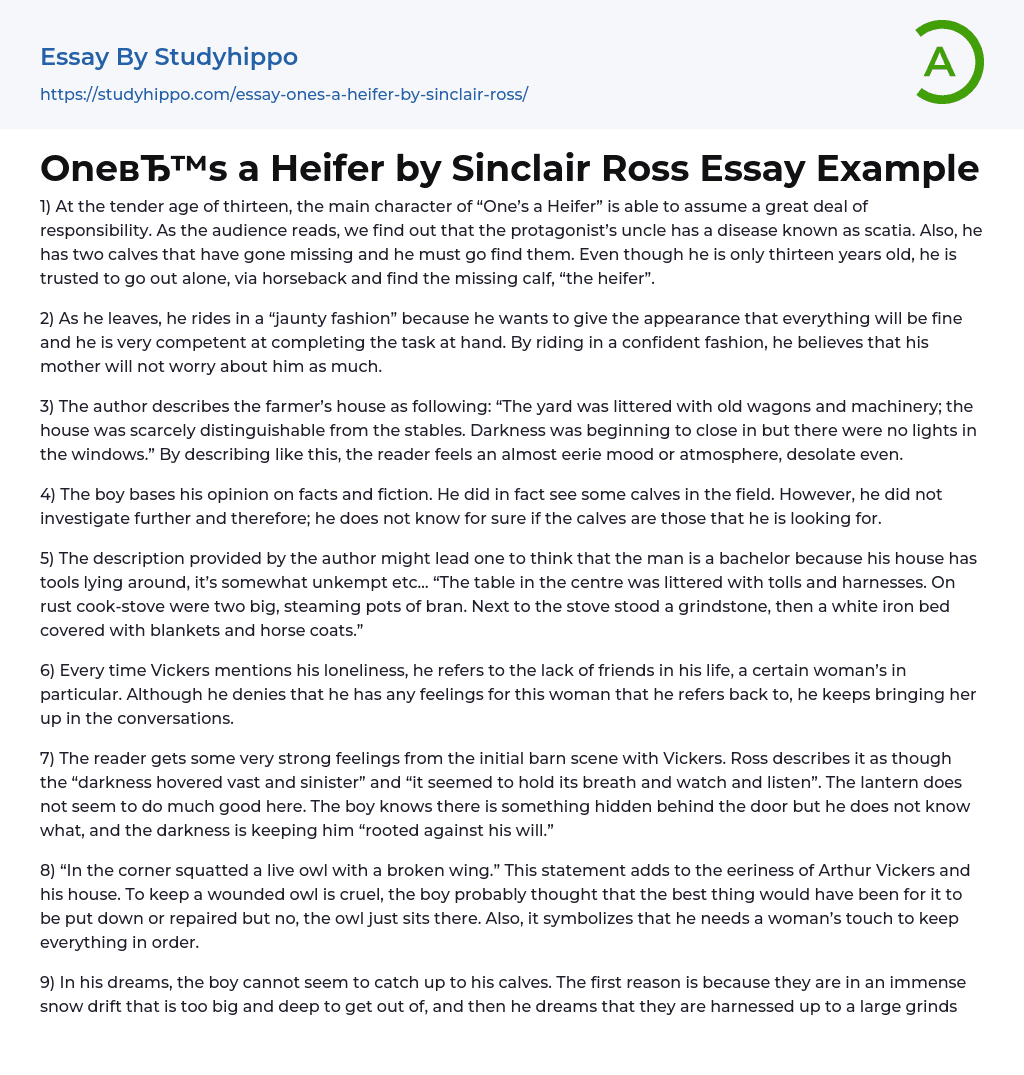1) At the tender age of thirteen, the main character of “One’s a Heifer” is able to assume a great deal of responsibility. As the audience reads, we find out that the protagonist’s uncle has a disease known as scatia. Also, he has two calves that have gone missing and he must go find them. Even though he is only thirteen years old, he is trusted to go out alone, via horseback and find the missing calf, “the heifer”.
2) As he leaves, he rides in a “jaunty fashion” because he wants to give the appearance that everything will be fine and he is very competent at completing the task at hand. By riding in a confident fashion, he believes that his mother will not worry about him as much.
3) The author describes the far
...mer’s house as following: “The yard was littered with old wagons and machinery; the house was scarcely distinguishable from the stables. Darkness was beginning to close in but there were no lights in the windows.” By describing like this, the reader feels an almost eerie mood or atmosphere, desolate even.
4) The boy bases his opinion on facts and fiction. He did in fact see some calves in the field. However, he did not investigate further and therefore; he does not know for sure if the calves are those that he is looking for.
5) The description provided by the author might lead one to think that the man is a bachelor because his house has tools lying around, it’s somewhat unkempt etc… “The table in the centre was littered with tolls and harnesses
On rust cook-stove were two big, steaming pots of bran. Next to the stove stood a grindstone, then a white iron bed covered with blankets and horse coats.”
6) Every time Vickers mentions his loneliness, he refers to the lack of friends in his life, a certain woman’s in particular. Although he denies that he has any feelings for this woman that he refers back to, he keeps bringing her up in the conversations.
7) The reader gets some very strong feelings from the initial barn scene with Vickers. Ross describes it as though the “darkness hovered vast and sinister” and “it seemed to hold its breath and watch and listen”. The lantern does not seem to do much good here. The boy knows there is something hidden behind the door but he does not know what, and the darkness is keeping him “rooted against his will.”
8) “In the corner squatted a live owl with a broken wing.” This statement adds to the eeriness of Arthur Vickers and his house. To keep a wounded owl is cruel, the boy probably thought that the best thing would have been for it to be put down or repaired but no, the owl just sits there. Also, it symbolizes that he needs a woman’s touch to keep everything in order.
9) In his dreams, the boy cannot seem to catch up to his calves. The first reason is because they are in an immense snow drift that is too big and deep to get out of, and then he dreams that they are harnessed up to a large grindstone just going in circles
and again, not being able to catch up to his lost calves.
10) Arthur never married the girl who came to his house because he said she was stupid. “She was so dumb that when we played checkers she forgot whether she was red or black.” He seems to talk about her quite a bit, saying the he is lonely, and yet he does not want to marry this girl who was totally willing to marry him.
11) The reason that Vickers gives as to why he does not want the boy to peer into the stall is that first, it’s just a harness room and there is nothing to see in there. Second, he claims that there is a hole in the floor and that a horse fell through it so it was not a smart idea to take the chance of falling through it as well.
12) The reader and the boy are finally convinced that Vickers is completely crazy and somewhat evil when arrives back home again. Arthur tried so hard to keep the boy away from the last stall on the left, coming up with excuses, watching him diligently….and yet, the calves arrived back him shortly after the boy went to look for them. If the calves were not in the stall, then one must beg the question: what was in the stall?
- Adoption essays
- Aunt essays
- Babies essays
- Bedroom essays
- Caring essays
- Children essays
- Daughter essays
- Divorce essays
- Dog essays
- Dysfunctional Family essays
- Family Tradition essays
- Family Values essays
- Father essays
- Foster Care essays
- Friends essays
- Grandparent essays
- Home essays
- Hometown essays
- Husband essays
- Jealousy essays
- Love essays
- Marriage essays
- Mother essays
- Online Dating essays
- Parenting essays
- Parenting Teens essays
- Parents essays
- Relationship essays
- Room essays
- Sibling essays
- Sister essays
- Wedding essays
- Wife essays
- Caste System essays
- Citizenship essays
- Civil Society essays
- Community essays
- Culture essays
- Deviance essays
- Discourse Community essays
- Female essays
- Filipino People essays
- Igbo People essays
- Indigenous Australians essays
- Indigenous Peoples essays
- Men essays
- Middle Class essays
- Minority Group essays
- Modern Society essays
- Popularity essays




